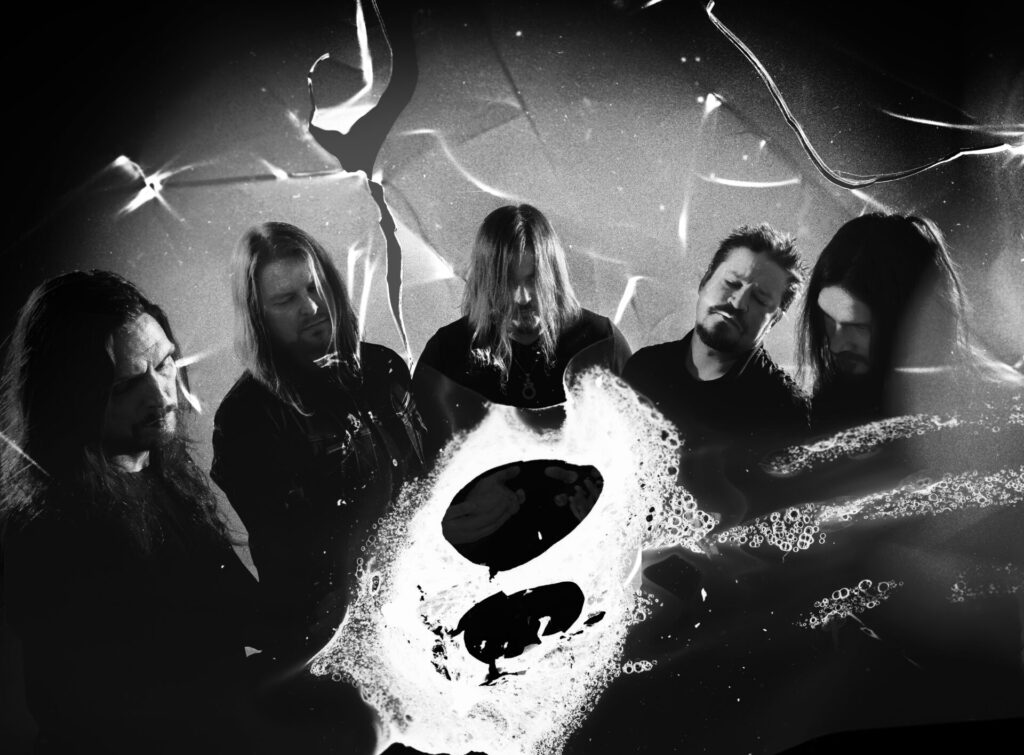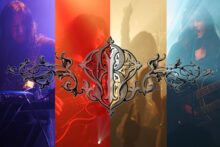Muuntautuja, the title of Oranssi Pazuzu’s sixth album, is Finnish for ‘shapeshifter’, a simple phrase that so elegantly describes the band’s bizarre sound that it’s a wonder they haven’t used it before. Starting out as a particularly adventurous avant-garde black metal band, their sound has gradually morphed into increasingly unrecognisable shapes on subsequent releases, with the progressive black metal of 2013’s Valonielu blossoming into full-blown space rock madness on 2016’s breakthrough Värähtelijä, stepping far beyond the confines of even the most out-there black metal acts to deliver some of the most genuinely disorientating psychedelia to ever emanate from a metal band.
Perhaps this was the perfect time for them to use this title however. Even for a band so prone to shapeshifting, Muuntautuja still feels difficult to pin down, feeling less like a metal record and more some unknowable Lovecraftian creature, dancing around the very peripheries of your simple human consciousness, flickering in and out of the shadows without ever giving you a proper glimpse at it. It’s a record of contradictions, in some ways – compared to the unfettered sensory overload of Värähtelijä, Muuntautuja feels almost understated. Yet it bristles with a subtle, serpentine intensity that’s just as attention grabbing as before, if not more so. The squelchy electronics that featured so prominently on 2020’s Mestarin Kynsi return here, but they too have shifted into even weirder forms.
The band have cited Death Grips and Portishead as influences on this record, which is surprisingly bang on the money. Tellingly, both acts came to mind on my first listen before glancing at the accompanying press release. The sickeningly sparse thud of the title track, for example, taps into the same nightmarish minimalism of Death Grips’ No Love Deep Web (and, positioned disarmingly second in the album’s running order, also serves as the first inkling that the band may have pushed way outside their comfort zone this time around).
The intoxicating gloom, crisply ominous bass and unsettling post-trip-hop rhythms of ‘Hautatuuli’, meanwhile, would have sounded right at home on Portishead’s Third, to the point you may catch yourself expecting Beth Gibbons’ spectral wail to come soaring out of the murk at any given moment (or even Sinead O’Connor, given how much that sweeping rush of searingly queasy synth sounds like the chorus of Massive Attack’s perennially underappreciated ‘Special Cases’). Guitarist Juho Vanhanen’s hoarse croak is particularly effective here, however, melding into the band’s multi-layered sound as another texture before pulling focus and howling atop the noise like the conscious mind rudely waking from a vividly unsettling nightmare.
Whilst it’s been several years since you could simply refer to Oranssi Pazuzu as a black metal band with a straight face, there are still notable traces of the genre coursing through their DNA beside the obvious vocal approach. On this record, that usually manifests itself in particularly contemporary ways – the sultry dark jazz inflections and melting industrial tone towards the end of ‘Valotus’ call to mind the jet-black gloss of Dødheimsgard’s recent Black Medium Current album, whilst the sprinkling of spacious keys atop dense, churning distorted guitars on ‘Voitelu’ hint at the spacefaring black dirges of Darkspace (albeit even more twisted and amorphous, as if you’re witnessing it being blasted straight through a worm hole in real time).
The most prevalent black metal influence, however, is of fellow countrymen Beherit. Perhaps not on a purely musical level (although the bloody minded riffing and distant, ghostly vocals that kick off ‘Valotus’ occasionally come close) but certainly on a spiritual one, with the album touching on a similarly surreal atmosphere to their ‘93 classic Drawing Down The Moon. Both records feel like they’re gnawing at the very fringes of what can constitute black metal, using simplistic structures and brutal repetition to tap into the most primal, animalistic urges buried deep in the genre’s subconscious. Whilst Beherit were broadening their horizons alongside the eruption of techno and acid house, however, Oranssi Pazuzu have decades worth of esoteric electronica to summon from, which really emphasises the ‘shapeshifting’ quality of this record. In Oranssi Pazuzu’s hands, the distance between Beherit and Death Grips feels less like an uncrossable, lightyears-long astral void and more an ancient, long dormant ley line between two sacred sites that has existed far longer than we can comprehend.
All these disparate influences fuse together seemingly entirely organically, never feeling ham-fisted or eclectic for eclecticism’s sake. In fact, you could certainly argue that Muuntautuja is Oranssi Pazuzu’s most cohesive outing yet. Even at its most obtuse, the record conjures such a singularly rich, nocturnal atmosphere, manifesting warped obsidian visages that somehow manage to coalesce into a much greater whole (much like whatever cosmic fuckery is happening on the cover art, come to think of it).
At a svelte forty-three minutes, it’s comfortably their shortest album, too, and yet also one of their most expansive. It may not have the same sprawling quality as Värähtelijä or the quicksand like pull of Mestarin Kynsi, but the sonic universe it suggests is so dauntingly well-realised it feels like it stretches out far beyond the record’s temporal confines, hinting at a scale immense enough to lose oneself in and, if you were to take a wrong turn, potentially never return from.
In hindsight, both the closing tracks on each of Oranssi Pazuzu’s last two records seemed to predict the direction they’d embark on next. The throbbing electronics that underpinned Värähtelijä’s ‘Valveavaruus’, for example, foreshadowed the overall sound of Mestarin Kynsi, whilst the punishing repetition and squealing, confrontational synths of that album’s ‘Taivaan Portti’ are a worthy primer for the darker vibe of Muuntautuja.
With this in mind, Muuntautuja’s closer ‘Vierivä Usva’ begins to feel almost vertigo-inducing, delving way out into the sparsest, most ambient terrain the band have occupied yet, a sinister smog of freewheeling synths and loping riffs untethered by percussion or any semblance of traditional song structure. It makes a very fitting end for the shape-shifting Muuntautuja, but thrillingly, also suggests that this might not even be the band’s final form.





